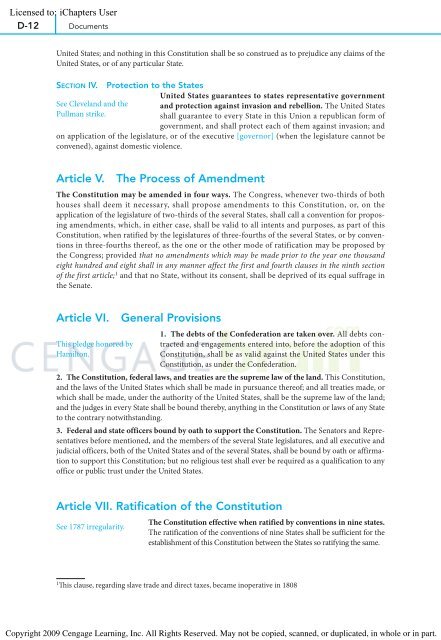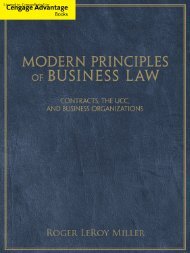03469_00_FM_pi-xxxii pp2.indd - CengageBrain
03469_00_FM_pi-xxxii pp2.indd - CengageBrain
03469_00_FM_pi-xxxii pp2.indd - CengageBrain
You also want an ePaper? Increase the reach of your titles
YUMPU automatically turns print PDFs into web optimized ePapers that Google loves.
Licensed to:<br />
D-12 Documents<br />
United States; and nothing in this Constitution shall be so construed as to prejudice any claims of the<br />
United States, or of any particular State.<br />
SECTION IV. Protection to the States<br />
See Cleveland and the<br />
Pullman strike.<br />
United States guarantees to states representative government<br />
and protection against invasion and rebellion. The United States<br />
shall guarantee to every State in this Union a republican form of<br />
government, and shall protect each of them against invasion; and<br />
on application of the legislature, or of the executive [governor] (when the legislature cannot be<br />
convened), against domestic violence.<br />
Article V. The Process of Amendment<br />
The Constitution may be amended in four ways. The Congress, whenever two-thirds of both<br />
houses shall deem it necessary, shall propose amendments to this Constitution, or, on the<br />
application of the legislature of two-thirds of the several States, shall call a convention for proposing<br />
amendments, which, in either case, shall be valid to all intents and purposes, as part of this<br />
Constitution, when ratified by the legislatures of three-fourths of the several States, or by conventions<br />
in three-fourths thereof, as the one or the other mode of ratification may be proposed by<br />
the Congress; provided that no amendments which may be made prior to the year one thousand<br />
eight hundred and eight shall in any manner affect the first and fourth clauses in the ninth section<br />
of the first article; 1 and that no State, without its consent, shall be deprived of its equal suffrage in<br />
the Senate.<br />
Article VI. General Provisions<br />
This pledge honored by<br />
Hamilton.<br />
1. The debts of the Confederation are taken over. All debts contracted<br />
and engagements entered into, before the adoption of this<br />
Constitution, shall be as valid against the United States under this<br />
Constitution, as under the Confederation.<br />
2. The Constitution, federal laws, and treaties are the supreme law of the land. This Constitution,<br />
and the laws of the United States which shall be made in pursuance thereof; and all treaties made, or<br />
which shall be made, under the authority of the United States, shall be the supreme law of the land;<br />
and the judges in every State shall be bound thereby, anything in the Constitution or laws of any State<br />
to the contrary notwithstanding.<br />
3. Federal and state officers bound by oath to support the Constitution. The Senators and Representatives<br />
before mentioned, and the members of the several State legislatures, and all executive and<br />
judicial officers, both of the United States and of the several States, shall be bound by oath or affirmation<br />
to support this Constitution; but no religious test shall ever be required as a qualification to any<br />
office or public trust under the United States.<br />
Article VII. Ratification of the Constitution<br />
See 1787 irregularity.<br />
The Constitution effective when ratified by conventions in nine states.<br />
The ratification of the conventions of nine States shall be sufficient for the<br />
establishment of this Constitution between the States so ratifying the same.<br />
1 Th is clause, regarding slave trade and direct taxes, became inoperative in 1808<br />
Copyright 2<strong>00</strong>9 Cengage Learning, Inc. All Rights Reserved. May not be co<strong>pi</strong>ed, scanned, or duplicated, in whole or in part.










